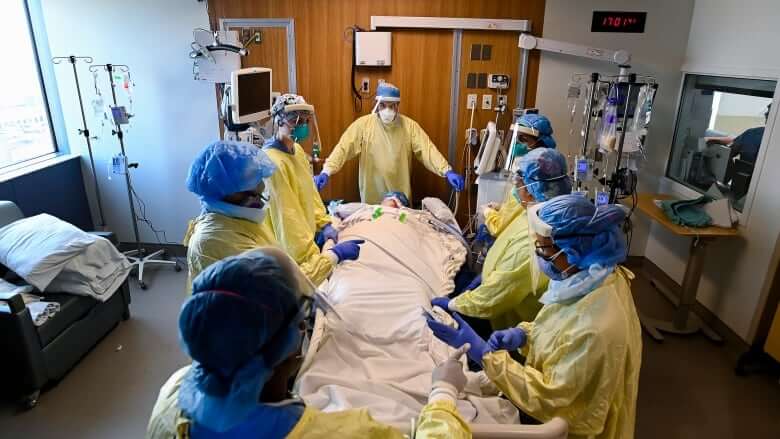Ontario hospital workers exposed to COVID-19 need not isolate if asymptomatic, test negative

Ontario hospital staff exposed to someone with COVID-19 need not stay home from work if they continue to test negative for the virus daily, according to a government policy designed to safeguard staffing levels as cases surge due to the highly contagious Omicron variant.
A spokeswoman for Health Minister Christine Elliott said hospital workers who have been in contact with a positive case must take a PCR test as soon as possible, and repeat the test on day seven.
They must also take rapid antigen tests daily for 10 days, and can only come into work if they remain asymptomatic and if all tests come back negative, Alexandra Hilkene said Wednesday.
Those with a household member who tests positive for the virus must immediately take a PCR test, and repeat it on days seven and 14 or 15, she said. They also have to take a rapid test daily while exposure to the COVID-positive household member is ongoing, and for 10 days afterwards.
“Any staff person that is a high-risk contact who develops symptoms should isolate at home until they receive a negative PCR test and their symptoms are improving,” she said.
Dr. Kieran Moore, the province’s chief medical officer of health, said Tuesday that there would be a “20 to 30 per cent risk of absenteeism” due to COVID-19 exposure if, like other workers, asymptomatic hospital staff who are close contacts of COVID-19 patients have to stay home from work.
He said that’s in line with influenza season.
Moore also said some of the province’s rapid tests must be reserved for health-care workers, to ensure they can keep working in the event of an exposure.
Premier Doug Ford has warned that Omicron threatens to overtax the health-care system, as thousands of people test positive for the virus each day.
The province reported 4,383 diagnoses Wednesday and nine new deaths linked to the virus.
Health Minister Christine Elliott said 918 of the cases are in people who are not fully vaccinated, and 222 are in people whose vaccination status isn’t known.
Elliott said 420 COVID-19 patients are in hospital, including 311 who are not fully vaccinated or whose vaccination status is unknown. Provincial data showed 168 people are in intensive care due to COVID-19, including 132 who are not fully vaccinated or whose immunization status isn’t known.
Health units to change testing, contact tracing approach
Meanwhile, some public health units said they would change their approach to COVID-19 testing and contact tracing due to surging cases.
Public health units for Middlesex-London and Hastings Prince Edward — which covers the Belleville, Ont., area — said they were falling behind in notifying people that they had tested positive for COVID-19.
“If you develop respiratory symptoms, consider your illness as COVID-19, even without a positive test result,” the Middlesex-London Health Unit said on Twitter Wednesday.
It said there were 300 people in the region who had tested positive for the virus but had yet to be contacted by public health officials.
Those who have COVID-19 symptoms should immediately self-isolate and tell their close contacts to do the same, the health unit said.
Hastings Prince Edward Public Health, meanwhile, said it had shifted its efforts to administering booster shots instead of contact tracing.
“It will not always be possible for representatives of public health to contact individuals who test positive within 48 hours,” the health unit said on its website. “All individuals who seek testing should monitor for their test results online to receive their results as quickly as possible.”
Niagara Region Public Health also said it was beginning to shift resources away from contact tracing to delivering booster doses of COVID-19 vaccines, which it said can “better blunt” the Omicron wave.
Growing case numbers are making it difficult for people to access testing in a timely manner, which in turn is delaying the identification of cases for followup, the health unit said.
At the same time, Omicron has shortened the time between exposure and becoming contagious, making it less likely health officials can intervene early enough to break the chains of transmission, it said.








Redes Sociais - Comentários